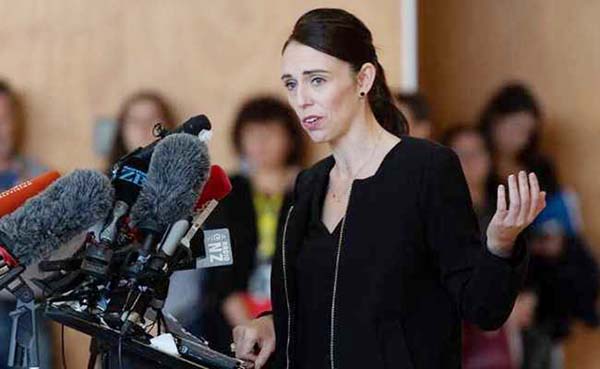
AFP, Wellington :
New Zealand Prime Minister Jacinda Ardern announced an immediate ban on the sale of assault rifles and semi-automatics Thursday in a muscular response to the Christchurch terror attack that killed 50 people.
“Today I am announcing that New Zealand will ban all military-style semi-automatic weapons. We will also ban all assault rifles,” Ardern said, while announcing interim measures that will stop a rush of purchases before legislation is enacted.
“The effect of this will mean that no one will be able to buy these weapons without a permit to procure from the police. I can assure people that there is no point in applying for such a permit,” she said.
She added that high capacity magazines and devices similar to bump stocks-which make rifles fire faster-will also be banned. “In short, every semi-automatic weapon used in the terrorist attack on Friday will be banned in this country,” she said.
For the guns that are still out there, Ardern announced a buyback scheme that will cost between Nz$100 million and $200 million (between US$69 million and $139 million), depending on the number of weapons received.
To “the current owners of the weapons we have moved to ban, I acknowledge that many of you will have acted within the law,” Ardern said.
“In recognition of that and to incentivise their return, we will be establishing a buyback scheme.”
Anyone who keeps the guns after an amnesty period will face fines of up to $4,000 and three years’ in jail.
Ardern brushed aside suggestions of opposition to the ban.
“The vast majority of New Zealanders will support this change. I feel incredibly confident of that,” she said.
CNN adds: All military-style semi-automatic weapons, assault rifles and high-capacity magazines will be banned in New Zealand following the mass shootings at two Christchurch mosques that killed 50 people, New Zealand’s Prime Minister Jacinda Ardern announced on Thursday.
“On 15 March our history changed forever. Now our laws will too. We are announcing action today on behalf of all New Zealanders to strengthen our gun laws and make our country a safer place,” Ardern said at a press conference in the capital Wellington.
The announcement came after the country’s cabinet agreed to overhaul the law and ban military-style semi-automatics and assault rifles 72 hours after the Christchurch attacks.
“Every semi-automatic weapon used in the terror attack on Friday will be banned,” Ardern continued, adding that she hoped the law would be in place by April 11. “This legislation will be drafted and introduced in urgency.”
An estimated 1.2 million guns are in circulation in the country, according to New Zealand Police-one for every three people. Ardern said the buyback scheme could cost between $100 million to $200 million.
Later on Thursday, New Zealand Police announced all 50 bodies from the shootings had been identified. “This means that all victims are now able to be released to their families,” Police Commissioner Mike Bush said in a statement.
Arden said a “nationwide reflection” for the dead would be held on Friday-one week after the attack.
The gun reform proposal will be introduced to Parliament in the first week of April. For it to come into effect, lawmakers need to vote on amending the existing legislation, the Arms Act 1983.
In the interim, New Zealand Governor General Patsy Reddy has signed an order to reclassify some semi-automatic weapons as “military-style”.
As a result, many people who legally owned certain firearms will no longer be able to possess them on their existing license conditions.
An amnesty will be put in place for weapons to be handed in from Thursday. Cabinet has directed officials to develop a buyback scheme, and Ardern said that further details would be announced “in due course.”
Bush said gun drops would be set up at police stations so citizens could safely hand in guns.
“I can’t emphasize enough that in the current environment it is important you do not take your now-unlawful firearm anywhere without notifying police,” Bush said. “It is absolutely vital that we manage the safe and organized transport of all firearms into police custody.”
Ardern pointed to similar measures taken in Australia following the 1996 Port Arthur massacre as an example for New Zealand to follow, including certain “exemptions for farmers.”
Police Minister Stuart Nash said the bill would include “narrow exemptions” for the police and the defense forces, as well as “legitimate business uses” such as professional pest control.
“Some guns serve legitimate purposes in our farming communities,” he added, noting that exemptions had been made for .22-caliber rifles and shotguns used for duck hunting.
Immediate action would be taken to prevent people from stockpiling weapons ahead of the change in law and to encourage gun owners to surrender their weapons, he said.
After Australia implemented a similar ban, the country destroyed more than a million weapons, and additional gun buybacks and amnesties have been conducted since. Last year, more than 57,000 weapons were handed in, including a rocket launcher and a World War II machine gun.
In the wake of the reforms, mass shootings in Australia dropped to zero, gun suicides declined by an average of 4.8% per year, and gun-related homicides declined by an average of 5.5% per year.
Philip Alpers, founding director of GunPolicy.org and a University of Sydney academic, said the buyback “has a good chance of delivering the same life-saving public health benefit as that which followed the 1996 Australian buyback.”

